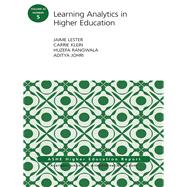
Note: Supplemental materials are not guaranteed with Rental or Used book purchases.
Purchase Benefits
What is included with this book?
Executive Summary 9
Acknowledgements 15
Foreword 16
Introduction to Learning Analytics and Educational Technology Tools in Higher Education 18
Introduction 20
Purpose of the Monograph 22
Current Trends in Higher Education 23
Status of Learning Analytics Research in Higher Education 29
Framework for Examining Learning Analytics in Higher Education 32
Organizational Theory 33
Technology Alignment and Adoption 34
Faculty and Advisor Beliefs and Behaviors 34
Student Use and Action 35
Ethics and Privacy 36
Outline of the Monograph 37
How Organizational Context and Capacity and Technological Alignment Affect Learning Analytics Adoption 38
Introduction 39
An Organizational Model for Individual Decision Making 42
Individual Factors 43
Institutional Levels 44
Institutional Levers 45
Organizational Context 46
Organizational Change 47
Institutional Logics 48
Organizational Readiness and Capacity 50
Technology Adoption and Alignment 52
Technology Adoption Models 52
Traditional Adoption Models 52
Education-Focused Adoption Models 53
Technology Alignment 55
Conclusion and Future Work 57
Faculty, Advisor, and Student Decision Making Related to Use of Learning Analytics Data and Tools 58
Introduction 60
Faculty and Advisor Decision Making 61
Professional Identity 62
Professional Beliefs 63
Professional Behaviors 64
Impact of Identity, Beliefs, and Behavior and Future Work 66
Student Decision Making 67
Learning Analytics Dashboards 67
Impact of Learning Analytics Dashboards on Student Actions 69
Sensemaking and Trust 71
Conclusion and Future Work 73
Ethical and Privacy Concepts and Considerations 74
Introduction 76
Ethics and Privacy: Definitions, Conceptions, and Influences 78
Evolving Definitions and Concepts 79
Ethics and Privacy Within the Higher Education Context 82
Institutional, Individual, and Data Considerations 83
Institutional Contexts 83
Individual Contexts 85
Consent and Agency 86
Trust and Bias 87
Data Considerations 88
Algorithmic Bias 88
Transparency and Trust 89
Security, Access, and Ownership 90
Laws, Policies, and Codes of Practice 91
Laws and Regulations 91
Policies and Recommendations 94
Challenges in Practice 95
Emerging Codes of Practice 96
Conclusion and Future Work 98
Recommendations for Moving Forward: Considerations of Organizational Complexity, Data Fidelity, and Future Research 100
Learning Analytics in Higher Education: Model Considerations and Recommendations 101
Organizational Logic, Leadership, and Value 101
Faculty and Advisor Input, Trust, and Engagement 104
College Student Interpretation of and Context for Data 107
Ethics and Privacy: Transparency and Ownership 110
Data Concerns and Recommendations 113
Data Access, Provenance, and Fidelity 113
Use-Case/Scenario-Based Design of Systems 114
Work Practice Integration of Systems 114
Personalized Information to Stakeholders 115
Use-Inspired Research in Pasteur’s Quadrant: Integrated Education, Research, and Advising 115
Privacy, Accountability, Transparency, Security, and Trust 116
Suggestions for Future Research 116
Quasiexperimental Design of Intervention Impacts 117
Modeling Student Engagement 117
Modeling and Visualizing Student Learning Preferences and Prior Learning Outcomes 118
Developing Ethical Codes of Practice and Use 119
Conclusion 121
Resources 122
References 125
Name Index 137
Subject Index 143
About the Authors 147
The New copy of this book will include any supplemental materials advertised. Please check the title of the book to determine if it should include any access cards, study guides, lab manuals, CDs, etc.
The Used, Rental and eBook copies of this book are not guaranteed to include any supplemental materials. Typically, only the book itself is included. This is true even if the title states it includes any access cards, study guides, lab manuals, CDs, etc.